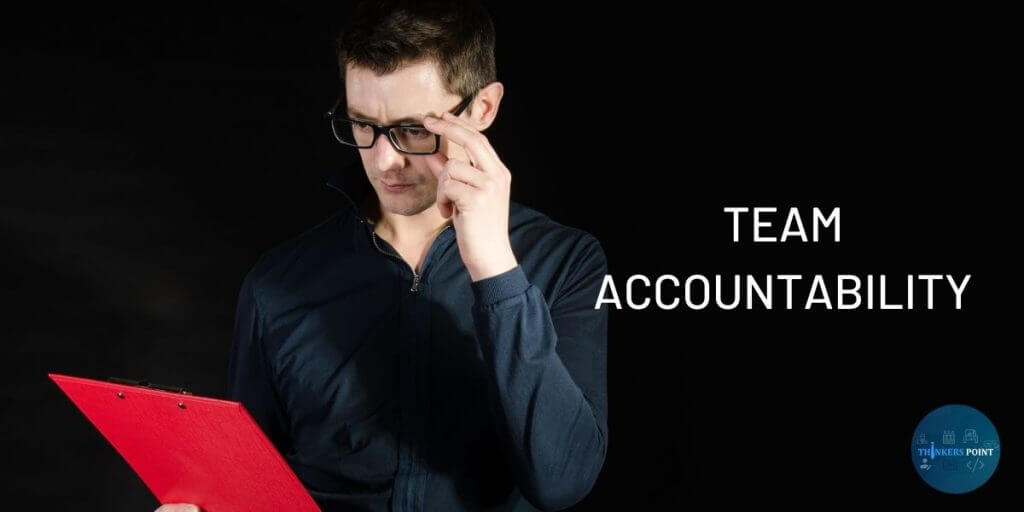Accountability breeds responsibility. For the fluency within the process of labor, it’s important to possess trust, belief and accountability.
Accountability is that the acceptance of one’s actions or taking responsibility.
It is very essential to require responsibility and be in charge of your actions. Without team accountability, we observe incompetency and unproductivity within the team.
Unfortunately, we relate accountability as an individual’s quality.
For example: Suppose, you’re employed in a firm, and there’s a huge project, with new opportunities arising. We realize the importance of being perfect during this project.
Now take an example of you being a part of a sub-team of the most organizing team. Every member of your team is accountable for making this a hit, but would even be liable for making blunders.
So if there’s an error done by you, you ought to be held accountable in your sub-team. But, meanwhile, your sub-team would be held accountable ahead of the most team.
Here we see the difference within Accountability with reference to Team.
Shifting that mindset is critical yet necessary. Especially as teams because they evolve from hierarchical, top-down structures, to horizontal and networked.

Today, all organizations operate at an accelerated pace. During a more volatile and open places. able to accept changes.
As a result, Team formed today, got to be more responsive and active to influence. They also got to be more conscious of the impact that each action makes because it ripples through the interconnected world of labor.
In the past, job function generally defined accountability; it had been there within the role and description.
Today, an efficient team structure depends on collaboration. The way of laboring together as a relationship of work. Within that distinction between the individual and therefore the interconnected team member lies the essential paradigm shift.
Definition of Teamwork and Accountability
Team members hold one another accountable. There’s clarity around roles and responsibilities with a high follow-through. This is often quite a high level of individual accountability.

This shift in mindset creates a far better environment, for people to grow in. When the main target is on individual accountability, the stress is on “My Task” or “My Performance.” As a result, accountability can cause a symbol test, with negative outcomes.
Individual accountability remains essential, but there’s a robust relationship component that encourages mutual support. This also brings bore clarity to the concept, and brings out the essence of team in team work.
From there we see a shift from “My Responsibility” to “Our Responsibility” in bringing out better outcomes. Saying that individual accountability resides within this larger team context.
Instead of being trapped within the blame game of “Did you or didn’t, you are doing what you were assigned?”. Or “ Does one know the team was held responsible?”
Team Accountability takes on a more positive tone. It’s about learning from the experience versus being vigilant about performance.
Conditions Necessary for Team Accountability
In order for Team Accountability to be strong, these four conditions got to exist:

1. Clarity in Roles
Although this might be very clear initially glance. We frequently tend to mingle unknowingly with the roles.
2. Defined Responsibilities
As roles are defined, responsibilities must be assigned in team.
3. Empowerment
The authority to try to do what’s expected and support by the team to form it happen.
4. Commitment towards the Team
This should be present at the team level without judgment or reconsideration. Holding on to at least one another for the sake of the team. Learning from every experience, while incorporating learning into simpler team practices.
The Keys to Success in Team Accountability
Clarity & Transparency is the key to success in team accountability. What undermines accountability is confusion and misunderstanding caused by unspoken assumptions and expectations.
How many times have you ever found yourself shocked by someone’s action or reaction, and blurted, “But I assumed…”?

One way to ascertain how team accountability is valued is to match where it shows up within the ranking of Productivity factors for teams.
For High Productivity/High Positivity teams, accountability ranks third. That’s third among the seven productivity strengths within the TCI team effectiveness model. This ranking is that the results of data culled from our work with thousands of teams.
For all teams, team accountability ranks within the middle: fourth out of seven.
And for Low Productivity/Low Positivity teams, accountability in team ranks fifth out of seven. you’ll also see the difference once you compare High Productivity/Low Positivity teams with High/High teams.
In both cases, there’s a stress on getting the work done.
In the first case, the stress is on: How am I doing? On high performing teams, the stress is on: How are we doing?
What Gets within the way for many Teams
Or
What are the hurdles during Team Accountability?
In our experience, the amount one reason why teams perform poorly around Team accountability is that it feels threatening.
All too often we discover team members are unwilling to interact and hold each other accountable.
There’s an underlying fear that it’ll cause conflict and emotional responses, instead of constructive reflection.

The irony is that increased learning and process improvement are the particular outcomes of felt accountability in teamwork.
In many teams, there’s an unspoken belief and a false dichotomy in situ.
If we’re accountable it’ll cause upset and that we won’t get along well together. And that becomes a justification for being nice rather than direct and clear.
A secondary reason is that the majority of team members aren’t skilled during this competence in order that they twiddling my thumbs.
They’re afraid they won’t have the proper words, or that they’re interfering—stepping on toes.
Team members twiddling my thumbs and tolerate the intolerable. This bogs the team down and leads to stasis.
Over time it festers and grows and becomes the very thing they were trying to avoid: Heated Conflict.
Some team members want to go away the “Hard Conversations” up to the team leader.
In many organisations reward is predicated upon individual performance so there’s little incentive to plan to team results.
The list of reasons why team members don’t hold each other accountable is long. The consequence is that this lack of accountability undermines the team.
Laying the Groundwork of Team Accountability
For most teams, the primary step is to clarify the excellence between individuals and team accountability.
There must be an awareness round the lack of team accountability.
A mind shift that replaces the main target on individual performance with collaborative results.

This shift, in fact, is quite a special way of watching accountability in team.
It must be present in new behaviours that the team can practice together.
Awareness shines a bright light on team accountability but it’ll only improve with new behaviour that becomes a habit.
In the context of team development, this becomes a chance for the team to make its own accountability protocol.
Once this is often in situ the team can then be in charge of practicing it.
The obvious focus here has been accountability as a definite competence for teams.
Other Team Performance Indicators from the TCI team effectiveness model also are live.
The level of trust on the team, the power of team members to interact in constructive interaction.
Alignment on key outcomes proactivity rather than expecting somebody else to require responsibility, and so on.
Each factor may be a doorway to an improved team performance that starts with a conversation to boost awareness.
From there the team can explore what’s working and what’s not working in order that new behaviours can begin to require place.
4 Ways to Enhance Team Accountability

a) Establish Team Agreements
Most teams are through the exercise of making team agreements. And most teams do a poor job of holding each other in charge of those agreements. There’s a chance then for the coach to ask: “What will you are doing, as responsible team members, once you notice the team agreements aren’t being kept? How will you accept responsibility for this?” This becomes a conversation to style a singular team protocol for that situation.
b) Define the Outcomes
If this team were a top performer in mutual accountability, what would be different? What does this team get to learn or practice to succeed at that level?
c) Create Clarity around Roles & Responsibilities in Team
Look for a team process where there’s a scarcity of clarity around roles and responsibilities, where there could also be unspoken assumptions or misalignment on expectations. Take the time for team members to know one another’s roles and responsibilities and therefore the interconnection
d) Reflect Upon Past Wins
Have team members share stories about situations where true team accountability was strong. What made it possible? What was the consequence? then the opposite: Team stories where team accountability was absent (but needed) and therefore the impact on team performance.
The team begins to know and accept that they need nothing to lose and everything to realize.
They begin to experience the facility of their connectedness. They begin to find out and join as a gaggle.
Frequently Asked Questions:
Ans. Team Accountability comes from having the ‘Difficult Conversation’. To have to bring out the simplest in your team, you ought to first have the strength to speak to them about everything. This is also inculcated by giving as many tasks as possible.
Ans. This is important because it is for a team to feel Accountable. This can be done by tracking down individual growth and contribution in a given task, this is able to even help the person grow and also make the person realize his own mistake.
Ans. Promoting accountability can only come by setting wise and real examples. Accountability may be a responsibility that shouldn’t be taught or promoted. It’s a policy that each person is assigned to as soon as they’re employed. And not just employment, it’s a policy of life also.
Read and learn more about other Soft skills:
- Support: A Teamwork Skills
- Communication skills
- Interpersonal Communication Skills
- Ideas: Importance in Teamwork
- Leadership
- Delegation in Teamwork
- Flexibility
- Efficiency: Improving Bottom line

